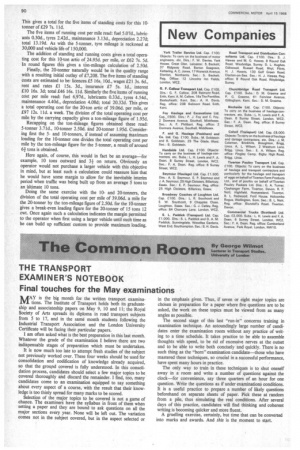THE TRANSPORT EXAMINER'S NOTEBOOK Final touches for the May examinations
Page 92

If you've noticed an error in this article please click here to report it so we can fix it.
MAY is the big month for the written transport examinations. The Institute of Transport holds both its graduateship and associateship papers on May 9, 10 and 11; the Royal Society of Arts spreads its diploma in road transport subjects from 5 to 17, and in the same month students following the Industrial Transport Association and the London University Certificate will be facing their particular papers.
I am often asked what is the best preparation in this last month. Whatever the grade of the examination I believe there are two indispensable stages of preparation which must be undertaken.
It is now much too late to attempt fresh studies of the subject not previously worked over. These four weeks should be used for consolidation and codification of knowledge already acquired, so that the groupd covered is fully understood. In this consolidation process, candidates should select a few major topics to be covered thoroughly arid discard the remainder. I find, too, many candidates come to an examination equipped to say something about every aspect of a course, with the result that their knowledge is too thinly spread for many marks to be scored.
Selection of the major topics to be covered is not a game of chance. The examiners have the syllabus in front of them when setting a paper and they are bound to ask questions on all the major sections every year. None will be left out. The variation comes not in the subject covered, but in the aspect selected or in the emphasis given. Thus, if seven or eight major topics are chosen in preparation for a paper where five questions are to be asked, the work on these topics must be viewed from as many angles as possible.
The second stage of this last "run-in" concerns training in examination technique. An astoundingly large number of candidates enter the examination room without any practice of writing to a time schedule. It takes practice to be able to assemble thoughts with speed, to be rid of excessive nerves at the outset and to be able to write both concisely and quickly. There is no such thing as the "born" examination candidate-those who have mastered these techniques, so crucial in a successful performance, have spent many hours in practice.
The only way to train in these techniques is to shut oneself away in a room and write a number of questions against the clock-for convenience, say three quarters of an hour for one question. Write the questions as if under examinations conditions. It is a useful practice to prepare a number of likely questions beforehand on separate sheets of paper. Pick these at random from a pile, thus simulating the real conditions. After several days of this practice, candidates will find thinking and coherent writing is becoming quicker and more fluent. A gruelling exercise, certainly, but time that can be converted into marks and awards. And this is the moment to start.








































































































































